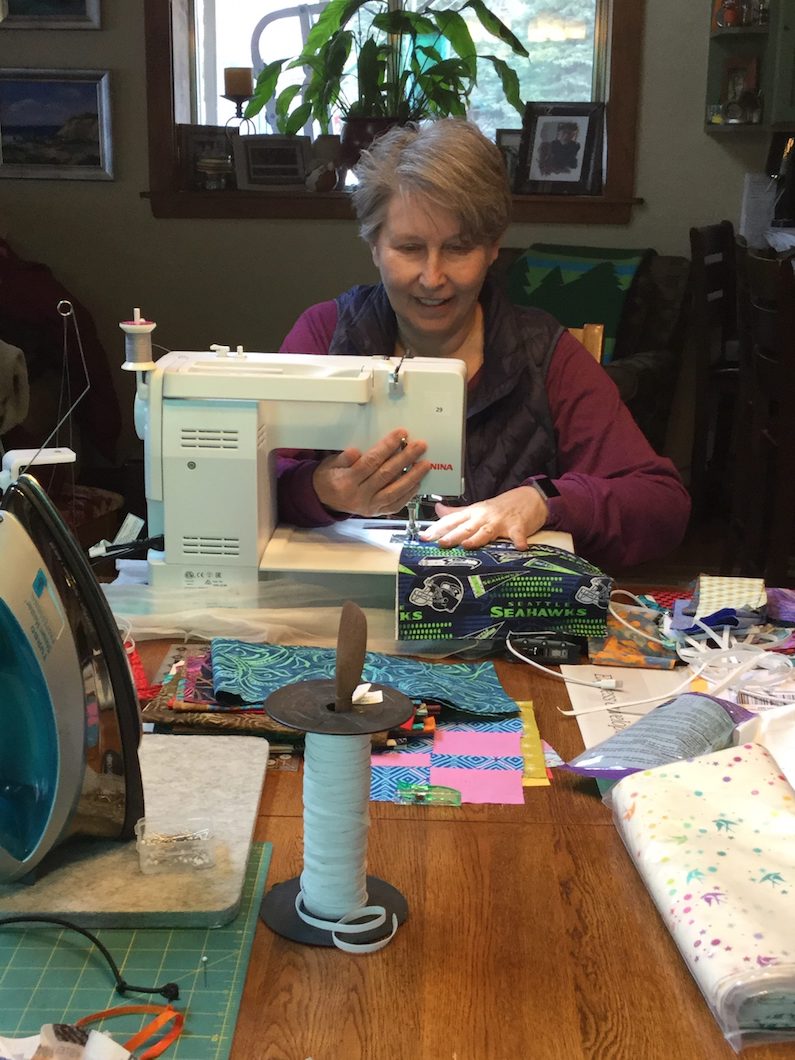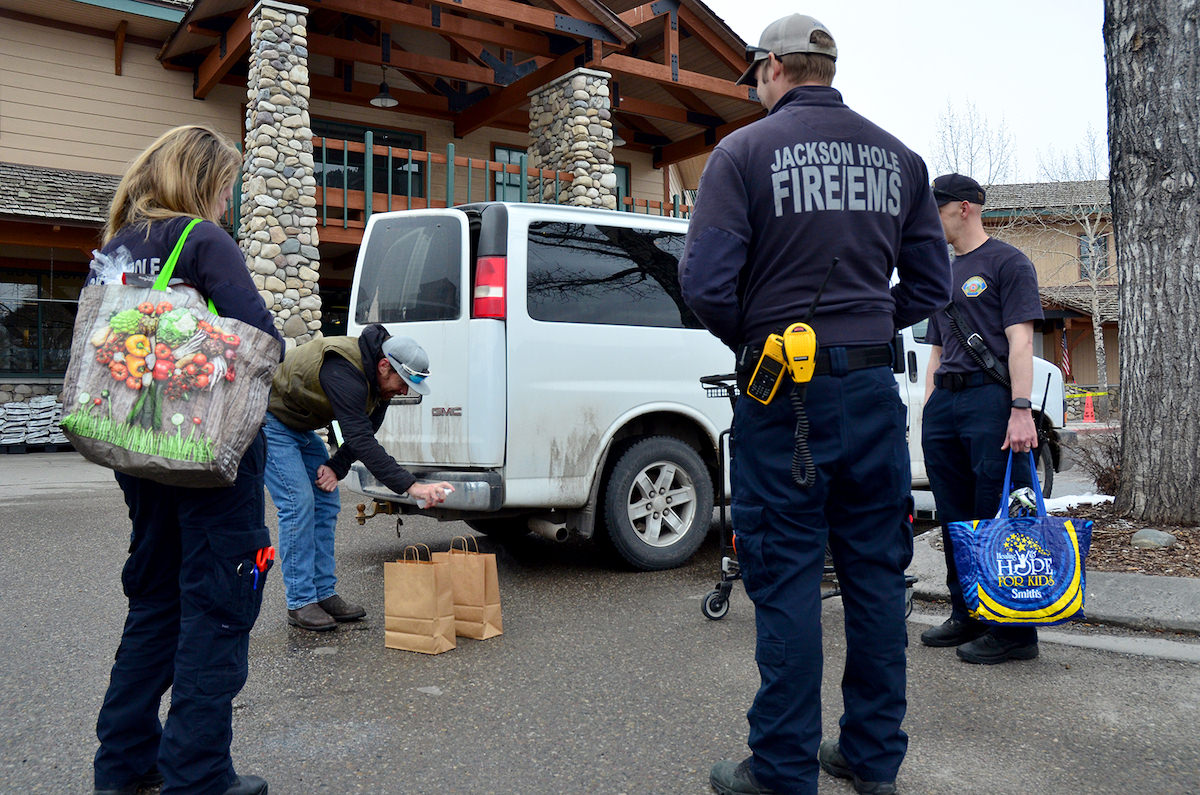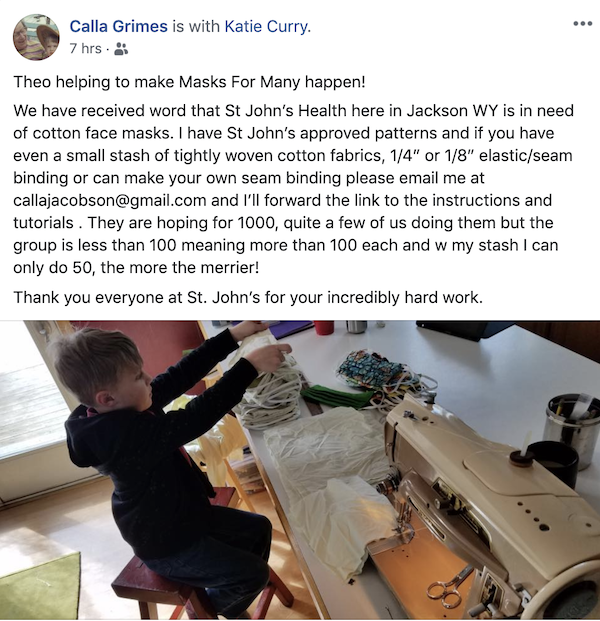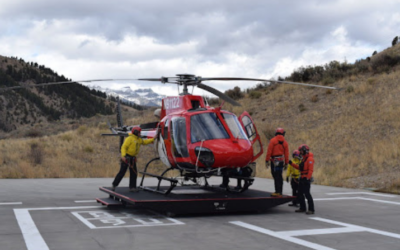Beyond the sliding glass doors at St. John’s Health primary care intake—where people with medical issues that fall outside the COVID-19 spectrum go—registered nurse Samantha Andreozzi is sitting behind a table. She’s wearing a mask and taking people’s temperatures with an oral thermometer in a disposable sheath.
A coveted bottle of hand sanitizer is stationed on the table. “The hand sanitizer is not too bad right now,” she said. “We’re rationing it, but our masks are what is getting low for us.”
Every nurse “has one mask a day and that’s already starting to deplete. And I know our materials department, a lot of this stuff is on backorder. So we’re just trying to ration everything.”
Luckily, Andreozzi says the hospital isn’t too busy right now. “Everyone’s been good about staying at home, but we’re just waiting for that influx and trying to ration those supplies.”
The hospital is also rationing gloves and gowns as they wait for more to arrive, Andreozzi said.
St. Johns Health has been meticulously assessing their supply challenges and prioritizing amid the COVID-19 pandemic. Karen Connelly, chief communications officer for St. John’s, says planning for a surge in patients is “one of the topics that we literally spend hours a day with our team and other agencies in the community thinking about and planning for.”
Connelly says the hospital is accepting mask donations of all kinds, both N95 masks that are used when providers are caring for patients with highly infectious diseases, like coronavirus, and masks people can sew at home. Members of the Jackson Hole Quilt Guild are already using online patterns to sew masks for medical uses outside the COVID-19 realm.

Janet Monahan of the Jackson Hole Quilt Guild and her fellow quilters have been “a huge help,” ER nurse Keegan Pfiel said. (Courtesy photo)
Meanwhile, St. John’s ER nurse Keegan Pfiel is leading the Jackson Hole Community Mask project to recruit community members to sew 1,000 masks. Already he has picked up roughly 100 unused masks from people around town. Now he hopes with a project tapping into people’s creativity that “we get much more than a thousand.” The project went live Thursday and residents are already heeding the call. Seamstress Calla Grimes is enlisting helpers of all ages.
For the sewing machine averse, Pfiel and recruits are also accepting material donations such as sewing supplies and cotton fabric.
Back in primary care, Andreozzi says the hospital team is focused on staying healthy as they take on additional duties, such as “odd jobs to help monitor temperatures at the door, (like she is) and to do swabs and home health.”
Andreozzi says she and her colleagues are preparing in other ways, too. They have practiced donning protective gear that they will wear to treat COVID-19 patients: “What we wear is a big gown and then we double glove.” The pause on elective surgeries is also helping to conserve supplies, Andreozzi said.
This week the hospital invested in a new novel coronavirus tent. Until then, St. John’s home health team had been driving all over the county swabbing people for influenza and COVID-19. The blue-and-white half-tunnel set up in front of the hospital provides another testing site.
“We can test more patients if we are not driving from one end of the county, from one person’s home, to the other end of the county to another person,” Connelly said. “So we think this is going to help us address capacity and just be generally more efficient.”
Connelly emphasized that the admission process for possible coronavirus patients stays the same: first, call your provider or St. John’s Health. Doctors and nurses will either administer care via telehealth and arrange testing or whatever in-person measures are necessary.
As of March 28, the hospital had submitted 129 COVID-19 tests. When St. John’s launches on-site testing in a few weeks, hospital officials say it will greatly expand testing capacity and shorten wait times from a few days to a few hours.
Minding Shopping Madness
A few miles from St. John’s Health, Albertsons is running full tilt.
Mitch Phlugh is restocking shelves. He wades amid a double-layer of boxes on the floor of the frozen section and reflects on the past week.
“Our stores were completely empty two days ago, but they send us 1,500 cases per truck of whatever we can get.”
Phlugh said it really just depends on “what shows up because we could order 300 cases and only 50 show up.”
Of course, products that promise to clean and disinfect are in high demand, he said. “Hand sanitizers, wipes. All that’s gone. But we can refill it, I guess.”
Toilet paper is a big focus.
“We got several pallets of toilet paper and before, what is it, nine, 10 o’clock, they’re all gone already. And no one can keep up with that.”
At 6 a.m. on any given day, Phlugh says there are probably 20 or 30 people waiting outside, peering into the grocery store’s sliding glass entrance, waiting for the doors to open. “Some people actually tried to come in at 4:30 in the morning and take supplies off of the shelf before we were open,” he said. “Yeah, that’s how bad it’s gotten.”
Regional suppliers are trying to maintain an even distribution of essential goods so individual stores are getting fewer than usual in every shipment. This week the White House announced measures to create a centralized national supply inventory.
“Some people actually tried to come in at 4:30 in the morning and take supplies off of the shelf before we were open. Yeah, that’s how bad it’s gotten.” – Mitch Phlugh, Albertsons
Outside Albertsons, some determined residents are meeting the coronaviral tide of demand and shortage with a dose of ingenuity and collaboration.
This is where disappointed hand-sanitizer shoppers can find a guy setting up a card table—not the table asking for middle school soccer donations or anything else. It’s the table of free hand sanitizer. Basic rules of hygiene and social distancing are posted here too.
Corey Milligan, owner of New West KnifeWorks, and some friends launched the group We are Jackson Hole to raise community awareness about COVID-19.
“We wanted to do our part to slow the spread of the coronavirus, flatten the curve,” he said. “We realized that two of the biggest concerns are: a lot of people aren’t practicing social distancing, which is the most important thing to do to slow the spread.” Number two: “There’s no hand sanitizer available really anywhere in both valleys that you can buy for any money.”
Milligan was struck by the hand sanitizer shortage not in the aisles of Albertsons, but closer to home. “My mother-in-law lives in Pioneer Homestead,” he said, his voice quivering with emotion. “And I found out they didn’t have any available, so that really is what got me started. And so since then, we’ve given it to anyone who needs it.”
That included three Jackson firefighters who stopped by to pick up some bags of sanitizer for the station. Milligan loaded them up and sprayed down the bags with disinfectant.
They made eight thousand bottles yesterday, but that is “not nearly enough.”
The recipe is simple, but Milligan learned collaboration is essential. Milligan was trying to make hand sanitizer at New West KnifeWorks. In the meantime, Grand Teton Distillery was too. “We were able to combine what we had to make it.”
The distillery makes the juice. Milligan’s crew bottles it. The team is thinking big, in terms of thousands of bottles to distribute in Idaho and Wyoming. But they need to overcome supply issues. “That’s the biggest challenge. I reached out last night to people who used bottles for other purposes, like having them on the ground in their factory.” Because buying bottles “in the normal supply chain is not going to happen,” he said.
Still, We Are Jackson Hole is not accepting bottle donations but they encourage people to bring their own bottles to fill. As they produce new batches, the group is also distributing hand sanitizer at Jackson Hole High School.
On Sunday, people stopped by the high school in a steady stream. George Glod, manning the tent, cheerfully handed out bottles. “How many folks in the household?” he asked a person who pulled up. “Just two? Perfect! We have two bottles for you that you can snag right off the table.”
Glod shared with KHOL the recipe for making hand sanitizer: “Super simple! It is glycerine, water, and isopropyl.” What you’re looking for is an alcohol content of 60% or more. You can use aloe vera gel instead of glycerine and water to take the desiccating edge off.
Of course, not everyone is cooking up hand sanitizer or tailoring masks. But as we wait to see where this will go, folks like Milligan and Glod say they want people to remember one thing: we’re in this together. And with healthy young people falling victim to COVID-19 and dying from severe acute respiratory distress, health officials say no one should feel impervious.







